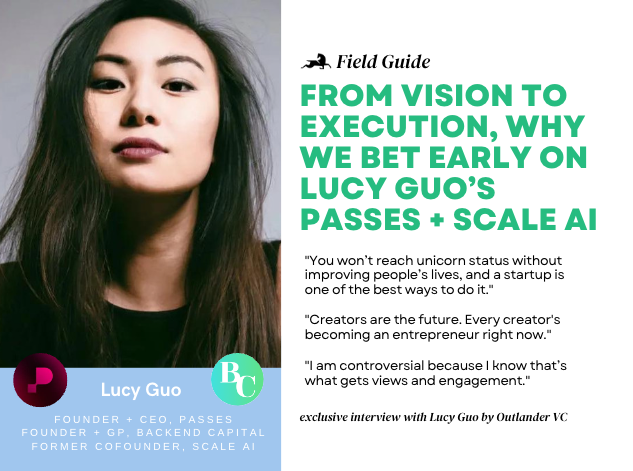From Vision to Execution, Why We Bet Early on Lucy Guo’s Passes + Scale AI
Posted by: Leila Chreiteh
Posted on 02/28/2023

Posted by: Leila Chreiteh
Posted on 02/28/2023

Lucy Guo’s tech entrepreneurship began as an act of rebellion. After the confiscation of her (admittedly, black market) Pokemon card and pencil profits in second grade, she taught herself coding and marketing and took her talents online. Never one to waste time, Lucy has since cofounded two Outlander VC portfolio companies: Scale AI and Passes. In 2016, Scale AI launched to help companies train, hone, and grow artificial intelligence systems. Since leaving Scale AI, she cofounded venture capital firm Backend Capital and, most recently, launched Passes, a software startup revolutionizing the creator economy with an all-in-one suite of content monetization tools.
“[Creators] are entrepreneurs,” Guo said at this year’s Forbes Under 30 Summit on October 3 in Detroit. “Most creator salaries I’ve seen match those of tech entrepreneurs and engineers. But maybe 10% of the creators are making almost all the money, and everyone else is barely making a living. There needs to be a shift.”
Prior to Scale AI, Lucy was a product designer at Quora and Snapchat. She studied computer science and human computer interaction at Carnegie Mellon but dropped out to pursue the Thiel Fellowship. For fun, she works on random projects (that have been used by 10M+ people around the world), skydives, works out (too much) at Barry’s Bootcamp, and rides electric longboards.
At Outlander VC, we bet on brilliant founders at the earliest stages using our Founder Framework. Outstanding founders like Lucy exhibit strength across the vision, intelligence, character, and execution categories of this framework. We grabbed time on Lucy’s busy calendar to dig into her founder journey and revisit a few reasons we’ve been bullish on her from day 1.
I’ve always been an entrepreneur at heart. When I was younger, I got suspended from kindergarten for selling everything from Pokemon cards to colored pencils at school. But when my parents started taking away those cold cash dollars, I turned to tech. I discovered PayPal and figured, “Okay, cool, this is how I can make money.” So, I taught myself how to code and started making bots and in-game items for gaming sites like RoomScape or NeoPets; then, I learned to build my own websites and make money through ads. So, My Pokemon cards and colored pencils became my virtual arcade game websites and internet marketing tools.
Then, I went to college for computer science and human-computer interactions, but I was actually going to a bunch of hackathons, where I discovered startups. Then, I received the Thiel Fellowship. So, with a few semesters left, I dropped out to start building.
No, my family is pretty risk-averse. My parents didn’t even want me to study engineering because “Women aren’t made for engineering,” so I should study to be a pharmacist instead because that’s what women are better at. All of which is funny because my mom was an electrical engineer! But she would say, “I was the only one in my class. It’s unusual for women to be good at it.” She didn’t believe I could do it because, statistically, it was less likely for women to excel in engineering or tech.
I, on the other hand, always wanted to prove myself. So, when my parents were pissed that I dropped out of college and told me I couldn’t do a startup, I wanted to prove them wrong. I had a chip on my shoulder. When people tell me I can’t do things, I like proving them wrong.
I’ve always been a quick decision-maker because I hate wasting time. Once I gather enough data, I act. You don’t need years of data for every decision. For example, you’ll never regret firing someone too early, but you always regret firing them too late if something’s not working.
This is also why I’ve always been a pivoter. If something’s not working, I take the original idea but change it slightly to test what gets a better product-market fit. Also, I always try to create a bare minimum MVP to ensure I don’t waste too much time in the initial engineering work without feedback from the target audience.
The desire to impact the world and people’s lives is the #1 thing that drives me. A startup can only become valuable if you’ve made a significant impact on people’s lives. You won’t reach unicorn status without improving people’s lives; a startup is one of the best ways to do it.
In the long term, I’ve imagined impacting people’s lives directly by starting a nonprofit targeting human trafficking. But, for one thing, I don’t know how to run a nonprofit, right? On the other hand, I’m good at startups. I’m good at figuring out ideas, building teams, and executing. So I figure I’m better off making money and donating to the best nonprofits. So, by focusing on what I’m good at, I can create a really f*cking big impact on other people’s lives.
An Uber driver mentioned how Paige Craig had coined the term “Silicon Beach” and said I should reach out to him. So, I did via Twitter!
I’ve always liked bouncing ideas off of Paige because he’s invested in so many companies that he’s knowledgeable in almost every space. He’s had his hands in a lot of different early-stage companies across a lot of different verticals. So, we’ve always kept in touch.
I like people who bet on me early and people who bet on me in general. So, when I started working on Passes, I wanted him to be part of the journey again.
Yes! Passes is the best place for fans to connect with their favorite creators.
One of our differentiators is that even though Passes is a Web3 platform, we built it very Web2.5 because we want to be one of the first companies to onboard people onto Web3 easily. We’re one of the new products with good UX where all you have to do is sign up with an email, pay with your credit card, etc., and then the NFT mints into a wallet we create for you.
Passes allow creators to scale one-to-one intimate relationships. I can’t go into our secrets, but most creators make money through pay-to-view and customer-requested content (think: Cameo). Passes lets them take a piece of content and DM it directly to their target audience. So, for example, if I have a segment of CosPlay fans within my audience, Passes lets me send CosPlay-specific content directly to them as a locked, pay-to-view direct message. Direct messages gave a much higher purchase rate than platforms like Patreon, where all the content is available on one feed.
One of our creators was making $515/month on Patreon; on Passes, she is now making $40,000/month. Another creator was making $2.8k/month through Instagram subscriptions, and within 48 hours of using Passes, she’s already made $6,000. So, our tool is helping creators make life-changing money that scales with their fanbase.
Learn more about Passes here.
My short-term goal is to make all our competitors obsolete, and Passes already has more features and is built to be more scalable than most competitors.
Creators are the future. Every creator’s becoming an entrepreneur right now. We are seeing creators starting VC funds, brands, etc., and they’re realizing the value of being an entrepreneur instead of just relying on brand deals, especially with the influence they have over their fans. So, in the long term, Passes is building a suite of tools to help creators become entrepreneurs and build wealth, too. Think about Google’s suite of tools, right? We want to be that suite of tools for creators.
Twitter is a great sales funnel. Generally, I am controversial because I know that’s what gets views and engagement. I think it’s better to be a little polarizing because, especially for hiring/recruiting for an early-stage startup, you can’t compete with the budgets of larger companies. The best engineers are getting paid $500,000 a year in cash. You can’t do that as a startup. People are going to work for you because they want to work for you, right? If you have super fans who are die-hard for you, they will take a huge pay cut to work for you because they believe in you. So, I think it’s much better to be polarizing in that sense. Elon Musk is an excellent example of this, actually. Even while Twitter is like paying pretty poorly, people are at Twitter because they just want to be next to Elon Musk.
Explore all of Outlander VC’s brilliant portfolio companies!

Leila is a communications strategist who believes in investing in a better, more progressive future.
As we explore the unknown of each new investment, our Field Guides are where we document all that we learn along the way.
So, whether you’re actively raising, trying to break into VC, or interested in our game-changing portfolio, our Field Guide's got you covered.
Sign up now for exclusive access to funding opportunities, events/resources from our network of experts, updates from our portfolio, and more!